#5 bhikkhus
Photo

The Quest for Buddhism (87)
Middle Way - the fundamental of the Buddha's teachings
The term "middle" in the Middle Way refers not to the middle of between the two things, but to moving away from the two things and transcending contradictory conflicts, while the "way" refers to the practice and method.
The unbiased, middle and correct path that is free from the two views of refusal and regularity, or existence and nothingness.
The Middle Way (Skt: Madhyama -pratipada, Pali: Majjhima-paṭipada) is a common Buddhist term used to refer to one of the major aspects of the Dhamma, that is, the teaching of the Buddha. It was given by the Buddha during his first sermon to the five bhikkhus (first turning of the wheel) at Sarnath. It refers specifically to the Noble Eightfold Path (Ref).
The phrasing (with "patipada"), refers to a spiritual practice that steers clear of both extreme asceticism and sensual indulgence. This spiritual path is defined as the noble eightfold path that leads to awakening.
The term Middle Way is widely valued in Buddhism, and its meaning can be shallow or deep, but all sects agree that the core of their dogma is expressed in terms of the Middle Way.
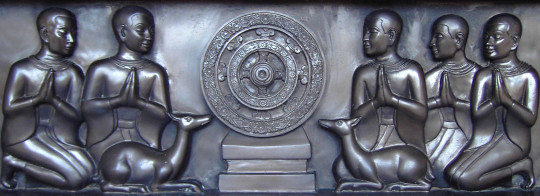
仏教の探求 (87)
中道〜ブッダの教えの基本
中道の〈中〉は、両極端な2つのものの中間ではなく、2つのものから離れて矛盾対立を超えることを意味し、〈道〉は実践・方法を指す。
断・常の二見、あるいは有・無の二辺を離れた不偏にして中正なる道のこと。
中道 (ちゅうどう、梵: マディヤヤマー・プラティパッド、巴: マッジマー・パティパダー)は、ダンマ、すなわちブッダの教えの大きな側面を指す共通の仏教用語である。ブッダが鹿野苑 (ろくやおん、梵: サールナート) において五比丘に対して初めての説法を行った際に(初転法輪)、ブッダによって与えられたものである。具体的には八正道(参照)を指す。
この表現 (“パティパダ”) は、極端な禁欲と官能的な耽溺の両方を避ける精神的な修行を指す。この精神的な道は、覚醒につながる八正道と定義されている。
中道の語は仏教において広く重んじられているため、その意味には浅深があるが、各宗がその教理の核心を中道の語で表す点は一致する。
#the middle way#buddha#buddha dharma#first turning of the wheel#sarnath#5 bhikkhus#noble eightfold path#spiritual path#patipada#buddhism#art#nature#philosophy#dogma#deer
87 notes
·
View notes
Text
the devil went down to quantico pt 5 [ previous parts here ]
just realized i never finished posting the scraps of this! probably this is the last part i'm gonna post. word count 3.4k (lol), emily prentiss pov. here's my outline notes as context: sinuous coexistence of multiple minds— q of how, whether, to write this. flashback to matthew; sensations of knowing. some experiences as matthew, patrick, johnny. return to obelisk. touch of angelology here, maybe: like how angels don’t have the same material individuality as humans, it’s not that there are multiple minds within hers, just an accumulation of a particular conative force. connect it with the doyle case: she hasn’t felt right in herself for some time.
Reid wrote his Philosophy Bachelor’s thesis on anattā, the Buddhist concept of ‘not self.’ He’d piled his desk high with library books and written it in a series of long, nocturnal sprints, alternately typing at a rate that seemed astonishingly slow and scribbling like a maniac in one of a series of yellow legal pads he ran through in the process. There was, he told her, head poking over a stack of dusty Sanskrit translations, a fourth century Classical Chinese commentary which presented the story of the traveler and the corpse. His hair stuck up at odd angles. It’s called … what was it? Èr guǐ zhēng shī. He pronounced the tones with careful precision. Two demons fighting for a corpse. An envoy took refuge in an empty house. A demon came in bearing a corpse; a second followed it in, and the two fought over who had carried the body in, and thus owned it rightfully. They asked the man to adjudicate and, realizing there was no pleasing both of them, he resigned himself to his fate and told the truth. The false claimant, enraged, began to tear the man limb from limb. Every part it tore off was replaced by the grateful first demon with the corpse’s corresponding member. Eventually, the man had been entirely reconstructed as the corpse; the demons, now mollified, ate the discarded body of the man. And the man thought, what am I? I’ve seen the body my mother bore entirely destroyed. Do I have a body, or none at all? Am I still a person? Am I still I?
He wandered back homeward until he came to a Buddhist stūpa, and asked there, do I have a body? And the bhikkhus listened and said, congratulations! All by yourself, you’ve severed poisoned roots, the errors of imputing permanence to the impermanent, and self where there never was any. And thence he was awakened from his false view of reality.
Say you were to argue that there was a self, based on the fact that one perceived oneself to occupy a body. If there were no essential basis for this perception, one might perceive that I in the non-contiguous bodies of others as well. After all, without a true or meaningful logic, that I has no real permanence in your current body, and no claim to possess it. In that way, the traveler and the corpse were like the two squabbling demons.
Emily said to him, what about the traveler’s mental continuity? I would lay claim to my body but not yours because I perceive the world relative to this body, not yours.
Reid, delighted, shook a ball-point pen at her, and disappeared behind the books again.
It was the Ship of Theseus problem, but with higher stakes, because it had at its center not a boat you didn’t care about, but the problem of physical existence.
But say it was your mind … Say it wasn’t the body that was negotiable, but the I itself.
Say you were on your knees in tears at the stone feet of Christ, and what was bringing forth the fervor that made you weep was neither material nor cognitive I at all. Say you found yourself face to face with a priest those eyes had never seen before, but the mind remembered, and caused the body to greet that old enemy. Say that was the philosophical limit case. Say you brought that quandary to the bhikkhus. They might have said, Jesus Christ! This is a whole new category of error. Where on earth did you find it?
Wending back in her memory, there was a place where she converged with herself. There was Emily, perched precariously on the side of the tiled gabled dormer that crowned Matthew’s bedroom window. She had to lean far, far out that window to see her; there had been in her chest a thrill of panic, as her fingers, bone-white with exertion, gripped the windowsill with all their might. It wasn’t fear of the fall, but that the fall would bring discovery, and they couldn’t get caught. Emily stared back down at him with a very annoying look on her face. He was met with dark, half-heartedly teased hair and a fifteen-year-old’s best approximation of a weary look. It was sheathed in a long, threadbare black coat and a mismatch of meshes. The fall wasn’t without fear: it would be painful and awful to break a bone over this, an extremely childish choice made by an extremely childish person.
Emily had given up on whatever impression she was trying to project, and furrowed her eyebrows. Her eyeliner creased into odd shapes around her eyes. “What’s wrong?”
Maybe she’d looked then as she must look now; wild-eyed, gaunt, at some unknown odds with herself. It had been… there had been something. It had been a long, angry walk in the woods. There had been many of them. On them, he thought he’d understood Emily better, the way that she was mad at the world and couldn’t direct it. It had taken him a while to get past that; after all, the Bentons had it good, but not how the Prentisses did. Oh, so you had to move, from scenic locale to scenic locale, all the while knowing that your fate wasn’t that of the constantly transplanted army brat. No, not you; you got to live everywhere without ever being a newcomer. Ranks closed around her. What was in some settings a narrative of hardships for a college application essay was for her a personal statement. The world has enriched me in the following ways…
There had initially been something gratifying, about how miserable it seemed to make her.
What made him befriend her hadn’t been anything he’d seen in her, or any kinship he might have imagined. The fact that it did make her miserable was lucky for them, because it stopped the situation from becoming worse. What made Matthew sit down next to her at a picnic on the Feast of Corpus Christi was the incredible guilt he’d felt over that resentment, and that mean little spark of glee.
Emily never knew that. He’d seemed so nice, and so recognizably tired of it all. “You’d think they’d put on a better show of this being a holy feast instead of a networking event,” he’d said to her. She’d laughed. They hadn’t met before because her mother’s friends had impressed upon their children how important it was to make Emily Elizabeth Prentiss feel welcome, and so she’d taken up grudging residence on the periphery of a group of older teens who didn’t seem to realize she could understand them when they shit-talked her in Spanish and French. They came from all over, and had picked these languages up here and there. But maybe, she’d thought, that was the point, when the son of some Portuguese diplomat she’d only ever seen in passing stumbled his way around an insult, came up with la salope petite et démoniaque, and literally looked her way. She’d wrinkled her nose back at him. She and Matthew had laughed about that, too.
Emily took up smoking that summer, very obviously because she thought it looked cool. It was her guiding philosophy; she was fifteen. It was odd that Matthew had such an enormous sense of the importance of right action, given that he, too, was fifteen.
In the forest that day, she’d decided. God was one thing. The church, on the other hand, was many others. And it was then, too, that something seemed to move into his mind: Father Gamino had profaned the mass, when he considered rejecting them. Father Gamino would, at some point, be punished. He’d been right to stare him down, to make that cruel old man remember that these were children he was thinking damned beyond his capacity and will to help them. There would be justice, and soon. And then he’d seen the sun shooting up waves of oranges and pinks as it made its way below the horizon, and thought, how odd, wasn’t it just noon? and hurried home, where he knew Emily was probably hiding.
They’d met in secret, that summer. It would have been easier and safer to avoid each other at all costs, but they both felt they shared some terrible unspoken thing, vaster even than the abortion which seemed to have entirely failed to send out ripples in the sleepy, complacent Catholic high society they wandered. Everyone knew something had happened. His parents suspected they’d been sleeping together, or that Emily had gotten him into Drugs. They weren’t sure what kind, but Drugs was what girls who wore too much eyeliner did, and they weren’t about to let their son get involved. Elizabeth Prentiss, maybe for the first time in her life, hadn’t been able to get to the bottom of it, and Emily and Matthew both put up such petulant shows of innocent confusion that she gave up.
One of these days, Father Gamino will go to say his prayers and his mouth will be full of blood.
The problem of memory, of course, was that it gave you a sense of personal coherence. There were movies about this, and books, and philosophy too. This is me, I have it all in my head. The philosophy of the self was more properly about the mind than the body; after all, there would be a body long after the self evacuated it. If not, every sarcophagus and tomb of an incorrupt saint contained the world’s most wretched self, driven to madness by the twin, grinding boredoms of infinity and confinement.
Say those two demons went to the bhikkhus, bellies full of that traveler’s corpse. Do we have a body? Is this traveler ours, whose body we initially possessed? Don’t we now have the right to eat him too? Maybe the traveler would have gone to them, saying, this body is as much yours as it is mine. It had a beatific, incarnational ring. Emily didn’t know enough about Buddhism to know if it had the same faint edge of holiness, to die in a stūpa in the mouth of a demon. But enlightenment must teach you that romanticizing persecution is just the childish fetishization of your own importance.
The first drop of blood that fell from Father Gamino’s mouth dropped, slowly and thickly, into the dead center of the palm of his upturned hand. His last thought was of Padre Pio. He’d worked under Father Carlo Maccari, when he was writing a report on the man. Very softly, as the man padded into their presence, Father Maccari had murmured, arriva il santo! The words dripped malice the way Padre Pio’s hands, allegedly, dripped blood. On those hands were dark gloves; under them, weeping sores. The blood seemed to worm through the center of Father Gamino’s palm, where it filled the one below it. Then he realized his cupped left hand was running over, and his hands were stiff and immobile, two blood-filled rictuses mimicking their source. Then he knew nothing at all.
“I’m going back to Virginia in September,” Emily said. She regarded her. What would that be like, this girl in DC? “My—Elizabeth thinks I’d be better off there.” A grin, then, huge in a way her face wasn’t quite ready to accommodate, white teeth lurid against fading maroon lipstick.
It wasn’t like she needed the international education. It was a feather in your cap, if you happened to be one of the unlucky sort whose parents worked internationally but didn’t have legacy status anywhere up the family tree. Emily needed another cap for all her feathers. He was pretty sure Elizabeth Prentiss was planning to just drop Emily off at Princeton the September after she graduated, without even glancing at an application or interview.
Reid had been a nightmare, that spring. The only thing he had to do for the degree was that thesis, and he poured himself into it the way he poured himself into all his other endeavors of mind. The paper swapped his typical stream of factoids for a single, concentrated source, which just so happened to be 100,000 lines of Buddhist philosophy. It was obvious why he liked the field: he didn’t know Sanskrit, or Pali, or the Classical Chinese that housed the text he was writing on. It was a new thing to explore, to add to whatever tapestry of life all this higher education was helping him to weave in his head. The nightmare part was getting him to sleep, or leave. He’d occasionally drift off on top of a book, then appear again over the new wall of documents and monographs he’d built around his desk.
Emily began to suspect, very quickly, that he’d taken up interest in the text’s explication of suññatā because of his mother. In most academic settings, that would have been far more Freudian than it was. Reid merely stared down the two in barrels of his family medical history, psychosis and senility, and then turned to look at metaphysics instead. Emptiness, voidness, the essential non-essential nature of any given phenomenon, or dharma. This necessitated a destruction of emptiness itself.
“I can’t tell if that destruction is processual,” Reid said, “or given. It’s presented in terms of process towards enlightenment, but is also the epistemological ground for gaining enlightenment. It’s not that you destroy the essential self or nature of the eye or body, but that it was never there.”
Emily watched him, and wondered idly if he’d considered that he didn’t have to write this paper on this timescale. Doubtless he was already getting the degree. Doubtless this could be a matter of long-term exploration for him, which would alleviate both the desperately seeking air he’d taken on recently, and the absolute confusion he now instilled in strangers. You know, in the DZDL it’s demonstrated that… didn’t inspire a lot of confidence in beat cops. Nor did his explanation of what it was.
“Does it actually say destruction?” It wasn’t clear to her if she was helping him or not, but she felt some obligation. For all the fine mathematical tuning of his mind, the niceties of translation and analysis always seemed like second-order processes in a hierarchy he couldn’t quite descend. She had no doubt that, given a summer, he could wrap his head around Sanskrit; ten verb tenses didn’t strike fear into his heart the way they would a man with a mind that couldn’t work by paradigm. It was just what that Sanskrit held would be trickier.
“I don’t … know?” His hand went to his hair again, and fisted there.
“Well, it sounds like a lot of process towards enlightenment is predicated on the destruction of an idealist mentality.” Reid nodded. She considered the deep circles under his eyes and decided he could have that small condescension. “So that’s a process of destroying errors, isn’t it?”
He squinted.
“Aren’t these meant for contemplation?”
He unsquinted, and disappeared behind the stack of books again.
He wondered if it was really so simple, as the flight landed at Santiago-Rosalía de Castro. Was it comforting, that you could undo the thing that had already emptied you out? Was it a surprise, that some ideas were designed to shape your thoughts around them, and might take all your earthly days to give up their secrets?
Tommy Valentine shifted nervously next to him. Matthew wondered if he knew that the man next to him had seen his death. Matthew wondered if that, too, was something they shared. Tommy and Patty and Matty, all in the emergency exit row.
He saw Emily biting back tears for him in some dim bar. Her eyes were wide and gentle, which made her look young, but not as young as she’d been when he last saw her. She’d been freshly back to DC, then. She’d offered him her guest room. It’s you or a home office, and I don’t work from home.
And who was that woman, standing over him?
Father Gamino had died with a mouthful of blood, and a sort of dumb, animal fascination with the symbolism of his own death. Did he feel like this?
Her vision had been vivid, lively—livelier than memories should have permitted. Her memory had never been as visual, never practically Technicolor. As if paying a toll, it was suddenly gone; not black, not anything she saw as color. There just wasn’t, suddenly, where once there was.
The air around her was quiet. It had the kind of stillness of an interrogation room, which was deliberate and unfriendly, and buzzed with fluorescent humming and the abstract non-sound of anxiety.
Okay.
It was like all her other senses had quit her like her sight, and now were slowly returning. The first thing was pain. It twanged along her limbs. With it came an unfamiliar sensation of stasis in weakness, and a murderously burning dry sensation in her throat. She’d felt fucked up, when she’d woken up in her apartment with a sensation of lost time. This was different. This felt like something had gone very wrong indeed, and over quite a period of time.
Maybe it was nothing, but it felt like there had been a sound. Something moving, somewhere nearby. She opened her mouth, and the air made the back of her throat burn cold. It took a minute, before her body would comply. When it finally did, she’d bypassed the first, instinctive, craven cry, and also the more practical one, and arrived at: “Who’s there? I can’t see—”
Nothing. She tried again. “Is anyone there?”
It occurred to her that she was sitting cross-legged on a hard surface. She reached out, tentatively, and found a hard metal edge about a foot in front of her. As far as she could grope, the shape of a table emerged around her. She reached up above her, and found that movement impeded by a tightness in her arm and back.
Still nothing.
She tried to breathe in through her nose and was rewarded with a violently foul experience, the smell of bile and rot. It wasn’t like a dead body, not quite—there wasn’t any fleshliness to it, none of its sickly sweet, organic softness. The smell of rotting meat had an unctuous sharpness on the nose, when you got past the initial layers of rot. That was the most nauseous part. This was just tang, bitter and sour all the way down.
The possibility that she’d wandered into something far more serious than her own trashed apartment sprang to mind. It could just be that, given an hour or so, she’d see the world again, and this would all just be vomit and her overturned kitchen trash. She might not even clean up before she took herself to a hospital. Or it could be that the next time she’d show face at the BAU, it would be in the local PD’s crime scene photos.
What did you do, in these cases? Typically, a profile would guide her behavior. Why might someone abduct an apparently defenseless, insensate woman, and set her on a metal table, unrestrained and unseeing? But they might not know she couldn’t see. So it would have to be a room that was safe: it mattered very little that she saw it either because it had no identifying characteristics, or because she wouldn’t get out alive. Or her abductor thought she was blind…
But it was always important to remind them of your humanity. She wasn’t a 20-something co-ed; an unsub who’d choose her either needed her to be someone specific, or saw an opportunity and took it. Those were the ones who might be swayed. If not, the fact that the FBI would be looking for her was a formidable stick to whatever carrot she might represent.
“Can anyone— can anyone hear me? Is there someone there?” What if the sound she heard was his breath? “If you can hear me, my name is Emily …”
Still nothing.
What was she supposed to do? Wait? Die? Spill everything she could, until her audience took mercy on her? Spill it all, until the universe took mercy on her and let her see that there was no audience, only some peculiar fluctuation of her ego?
What if she wasn’t hearing right?
“My name is Emily Prentiss. Can anyone hear me? I can’t see.”
What if she wasn’t hearing right?
4 notes
·
View notes
Text
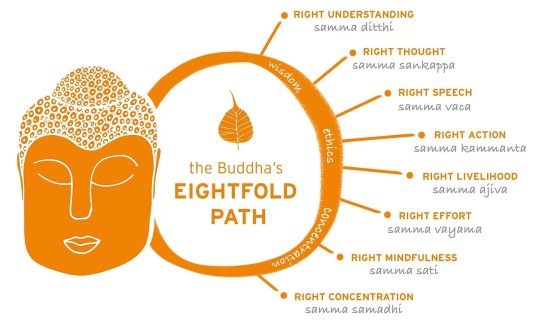
On Wise Communication
The 5 Precepts are the absolutes. Let's take abstaining from false speech as our example. Abstaining from false speech is the actual precept. One should never engage in it. Other forms considered to be wrong speech (harsh, divisive, and frivolous) should not be done in a general sense. But there may be times when they are appropriate. Thanissaro Bhikkhu puts it this way:
"One of the reasons the other forms of wrong speech are not expressed as precepts is because they’re not as absolute as the case of lying.
"There are times, for instance, when harsh speech is necessary. The Buddha gives an analogy: It’s like having a child, a young baby who still doesn’t know what to eat and what not to eat, and she’s put a sharp piece of glass in her mouth. You’ve got to do everything you can to get the glass out, even if it means drawing blood, because if the baby swallows the glass, the damage will be even worse. In the Buddha’s case, he said harsh things about Devadatta, to his face: one, in hopes that Devadatta might come to his senses, and two, to warn all the other monks around that Devadatta had really gone off course.
"Someone once called him on this, asking him, “Would the Buddha ever say anything harsh to anyone?” This was meant as a trick question, the idea being that if the Buddha said No, then they’d say, “What about what you said to Devadatta? That was harsh. It hurt Devadatta’s feelings.” And if the Buddha said Yes, he would say harsh things to other people, then the response would be, “Well, what’s the difference between you and other ordinary people?” So the Buddha’s enemies put the question to the Buddha, but he replied that the question didn’t deserve a categorical answer; it deserved an analytical answer instead. There are times when, in deciding what to say, he would ask, first, is it true? If it wasn’t true, he wouldn’t say it. Second, is it beneficial? And if it’s one of those rare cases when saying something harsh would be beneficial, then the next question is, is this the right time and place for that? Only if he could say Yes to all three questions would he say those things.
"This principle applies to harsh speech, and it also applies to divisive speech, because there are times when you see one of your friends suddenly developing a friendship with someone you know is abusive, you know is corrupt, you know is going to harm your friend, and you’ve got to find the right way to protect your friend. So again you may end up saying something that may sound divisive, but it’s with compassionate intent.
"As for idle chatter, there are times when simple social-grease conversation is necessary, to get a particular situation lubricated—as at work, when you want everyone to work smoothly together. But you’ve got to be very clear that this is your motivation, which means that it’s no longer purely idle chatter. You’ve got to be clear about the point at which it starts to become totally pointless, purposeless, where the grease is mucking up the works. You have to develop a sense of how much you should say to make people feel at ease, and then when to stop. This requires real discernment, which is why there’s no precept with this particular type of wrong speech. It requires you to be sensitive to the needs of the situation."
— Thanissaro Bhikkhu
5 notes
·
View notes
Text
Mindfulness: Gone [Anicca]
The Flow of life
After seeing how conceptual the sense of self is, and noticed the pain of it, it becomes easier to notice where the letting go points to. It points to a stillness that was always there. Looking for a concrete self and finding vibrations, and learning to preserve peaceful stillness, points to how impermanent everything is. Things arise and pass away. Therefore, nothing concrete can provide permanent happiness. Once the outside world is looked at in this way, the same perception can be turned inward.
Gone
The Zen practitioner Shinzen Young provided a memorable concept of Gone as a method of practicing with impermanence. He uses a noting practice which can be counterproductive when it interferes with concentration. Shinzen qualifies the practice: "As a general principle, put no more than 5% of your attention on the labeling process itself. The other 95% goes into the 'knowing.'" As you can recall in the 1st of this series. Bhikkhu Analayo emphasizes that concentration has to be enough to facilitate memory, or else it's already a form of mind wandering. The difficulty is getting the mind to realize that it doesn't need too much pressure to be aware. Just a small movement of attention is enough, and an internal knowing that is able to recognize what is there.
If you practiced the prior Jhanas practices, you should have a foundation to develop what is necessary for good noting practice: Concentration. Shinzen requires that concentration be good enough to detect all kinds of experiences vanishing/diminishing, to be able to stay focused on vanishing exclusively, and to not push and pull when a vanishing is happening. Essentially you have to be able to stay concentrated with equanimity. In the prior videos of this series, being able to let go of a gross sense of self, and to see the pain of it and to preserve peace, helps to motivate an equanimity to just be with sensations. This helps to bring a comfort, as opposed to terror. No matter what happens, "this too shall pass."
The Source
As Daniel Ingram pointed out before, this practice needs a good foundation to keep a person sane. With concentration as a basis for pleasure, it can prevent a psychological breakdown, which can happen with these practices when they are done without a sense of pleasure or a warmth towards oneself. Treating mindfulness as a means to an end, just increases suffering. Like in St. John of the Cross and his Dark Night of the Soul, the mind is being purified of addictiveness with it's eventual union with God, or Nirvana in Buddhism. This of course can go into an over-intellectualism, but nothing beats actual practice. Being clearly, but gently aware of what arises, and especially what passes away, relaxes the need to hold onto experiences. There's also a sense of rest that can be found with each letting go. For example, if something is unpleasant and it vanishes, then naturally there is relief. What is unexpected is that when good things are happening, and they vanish, the mind can learn to feel a sense of rest. The mind is finding something enjoyable to follow. Shinzen says that "you are gradually developing a sensitivity to detect the unborn source of consciousness."
This is a difficult practice, because the mind has to authentically let go in order for it to feel relief. By detecting gones with a sense of richness, and even a looking forward to another gone, prevents the mind from going into despair, and it can actually enjoy that stillness. The end of every breath is a stillness that timelessly contains all events. Shinzen defines ending as Nirodha in Sanskrit, or Nirvana, to blow-out. The blowing out quenches distress, and paradoxically becomes fulfilling. "As you become more sensitive to detecting Gone, you may come to a place where you note it so frequently that Goneness itself becomes an object of high concentration. The gaps between the 'Gones' get shorter and shorter until a figure-ground reversal takes place. Gone becomes the abiding ground. Self and world become fleeting figures. Needless to say, experiencing something like this will have a huge impact on how you relate to aging and death."
Even when death surrounds everything, there's an eternal nothing where everything comes from. It was always there, so a permanent sense of loss is comforted by a permanent sense of rest.
Gone - Shinzen Young: https://www.youtube.com/watch?v=L-7LXHjGHfM&feature=youtu.be
The power of Gone - Shinzen Young: https://www.shinzen.org/wp-content/uploads/2016/12/art_PowerofGone.pdf
What is Mindfulness - Shinzen Young: https://www.shinzen.org/wp-content/uploads/2016/08/WhatIsMindfulness_SY_Public_ver1.5.pdf
Dark Night of the Soul - St. John of the Cross: https://www.isbns.net/isbn/9780486426938/
The Science of Enlightenment - Shinzen Young: https://www.isbns.net/isbn/9781683642121/
Mastering the Core Teachings of the Buddha: An Unusually Hardcore Dharma Book (Second Edition Revised and Expanded) by Daniel M. Ingram: https://www.isbns.net/isbn/9781911597100/ Free version: https://mctb.org/
Contemplative Practice: http://psychreviews.org/category/contemplativepractice/
0 notes
Text
I found the evidence in support of my claim of avoiding singing Quran. Such practice is condemned by Gotama Budha as well in Sutta Anguttara Nikaya:
209 (9) Intonation
"Bhikkhus, there are these five dangers in reciting the Dhamma
with a drawn-out, song-like intonation. What five? (1) One becomes infatuated with one's own intonation. (2) Others
become infatuated with one's intonation. (3) Householders complain: 'Just as we sing, so, too, do these ascetics who follow the son of the Sakyans.' (4) There is a disruption of concentration for one wanting to refine the intonation. (5) [Those
in] the next generation follow one's example. These are the five dangers in reciting the Dhamma with a drawn-out, song-like
intonation."
0 notes
Text
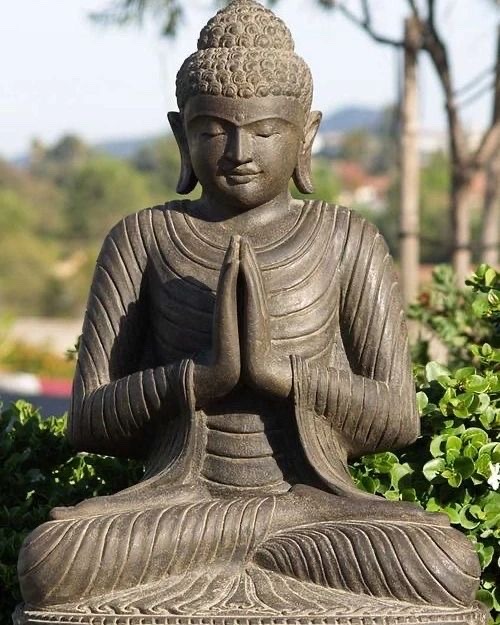
" At Savatthī. “Bhikkhus, in the past, when Sakka, lord of the devas, was a human being, he adopted and undertook seven vows by the undertaking of which he achieved the status of Sakka. What were the seven vows?
(1) “‘As long as I live may I support my parents.’
(2) “‘As long as I live may I respect the family elders.’
(3) “‘As long as I live may I speak gently.’
(4) “‘As long as I live may I not speak divisively.’
(5) “‘As long as I live may I dwell at home with a mind devoid of the stain of stinginess, freely generous, open-handed, delighting in relinquishment, devoted to charity, delighting in giving and sharing.’
(6) “‘As long as I live may I speak the truth.’
(7) “‘As long as I live may I be free from anger, and if anger should arise in me may I dispel it quickly.’
“In the past, bhikkhus, when Sakka, lord of the devas, was a human being, he adopted and undertook these seven vows by the undertaking of which he achieved the status of Sakka.
“When a person supports his parents,
And respects the family elders;
When his speech is gentle and courteous,
And he refrains from divisive words;
When he strives to remove meanness,
Is truthful, and vanquishes anger,
The Tavatiṁsa devas call him
Truly a superior person.” " ( SN 11.11. Vows )
#buddha#buddhism#buddhist#dharma#sangha#mahayana#zen#milarepa#tibetan buddhism#thich nhat hanh#enlightenedminds#enlightenedconsciousness#enlightenment spiritualawakening reincarnation tibetan siddhi yoga naga buddha#mindfulness#dhammapada#karma#loving kindness#kindness#deities
10 notes
·
View notes
Text
Lay Buddhist
Title- Qualities and Duties of Lay Disciples,Upasaka & Upasika
In this title, as the Buddhists, the must-need-to-know facts about qualities and duties of lay disciples will be dealt with. We must strive to be well-qualified lay disciples by understanding this title. I believe you all are already well-qualified lay disciples.
This title will cover the following sub-titles:
(#1)- The Role of Lay Disciples
(#2)- The Morality of Lay Disciples,
(#3)- The Livelihood of A Lay Disciple,
(#4)- Noble and Ignoble Lay Disciples,
(#5)- The Seven Causes of Decline for A Lay Disciple, and
(#6)- The Ten Qualities of A Lay Disciple.
(#1)- The Role of Lay Disciples
The word Upasaka means lay disciples who take refuge in the Three Gems, Everyone, old or young, who takes refuge in the Triple Gems is called “Upasaka”, and if one is a female, she is called “Upasika”.
The role of lay disciples in promoting and propagating the Sasana is very important. The duty of the Samgha is to promote and propagate the Sasana by teaching and preaching the Dhamma(Dhammanuggaha) and the duty of the lay disciple is to support the Samgha with the four requisites__Alms-food, Samgha-wears, Accommodation, Medicine(Paccayanuggaha). So the Samgha and the lay disciples are mutually dependent. The disciples should be able to go through thick and thin along with the Samgha(Samana-sukha-dukkha). They should be able to share their properties equally with the Samgha without any discrimination (Appativibhattabhogi). They should be always ready to support the Samgha, they should be like well supplying fresh water all the time so that the Samgha could promote and propagate the Sasana conveniently to be as bright as “the Moon and the Sun”.
When the causes for the decline of Sasana appear, a lay disciple should not remain unconcerned; he should join hands with the Sasana to uplift the Sasana. When disunity among the Samgha arises, he should render his service to bring about the reconciliation among the Samgha. At the time of the Buddha, in Kosambhi, lay disciples forcibly brought about the unity among the Samgha by withholding their support to the Samgha.
At the time of the Buddha, there were ideal male lay disciples such as the rich man Citta, Hatthaka Alavaka, Uggata, and the female lay disciples such as Visakha, Khujjuttara, Nandamata. Even when parents admonished their children, they used to say, “My son, if you live in human society, you must strive to be one just like the the rich man Citta; if you live as a bhikkhu, you must strive to be one just like the Venerable Sariputta; “My dear daughter, if you live in human society, you must strive to be one just like Khujjuttara; and if you live as a bhikkhuni, you must strive to be one just like Khematheri”.
The Buddha relied on lay disciples equally as he relied on bhikkhus and bhikkhunis for His future Sasana. The Buddha assigned appropriate responsibility to them. The bhikkhu, the bhikkhuni, the Upasaka and the Upasika are called the four persons who support and promote the Sasana. We should not forget that lay disciples like us have responsibilities just as bhikkhus and bhikkhunis do.
In performing the affairs of the Sasana, there are some tasks which are not proper to be performed by bhikkhus due to the rules of discipline for bhikkhus (Vinayas) laid down by the Buddha. Those tasks should be performed by lay disciples.
(#2)- The Morality of Lay Disciples
A novice must abide by the discipline of a novice, a monk must abide by the discipline of a bhikkhu and a lay disciple must abide by the morality of a lay disciple.
During the time of the Buddha, the Sakkyan prince Mahanama asked the Buddha to describe the morality of lay disciples. The Buddha replied to him thus: “A lay disciple must observe the five precepts, i.e. abstaining from killing any sentient being, abstaining from stealing, abstaining from committing sexual misconduct, abstaining from lying and abstaining from taking intoxicating drinks and drugs.”
According to this discourse, the five precepts represent the morality of lay disciples. One cannot be a lay disciple if one cannot observe the above five precepts. To be a well-qualified lay disciple, one should observe the five precepts steadfastly just as one keeps his lower garment tightly on the body.
(#3)- The Livelihood of A Lay Disciple
A lay disciple should be endowed not only with morality but also have faultless means of earning his living. The Buddha has advised the lay disciples to abstain from the following five immoral means of livelihood:
(1) Selling and buying weapons,
(2) Selling and buying human beings;
(3) Selling and buying meat;
(4) Selling and buying intoxicating drinks and drugs,
(5) Selling and buying poisons.
The above five means of livelihood are designated as immoral for they harm oneself as well as others. A lay disciple should make the right livelihood such as farming, and trading in commodities which do not harm oneself and others.
(#4)- Noble and Ignoble Lay Disciples
The following five basic factors will make a lay disciple ignoble:
(1) Having no faith and conviction in the Triple Gems.
(2) Having corrupted morality.
(3) Believing that unusual exciting things and news portend good luck (if they see, hear, smell, taste or touch pleasant things, they believe that these are blessings).
(4) Believing only in unusual things which they take as mundane blessings and not believing in Kamma and Its Results.
(5) Giving alms and paying homage to persons outside the Buddha’s Sasana prior to giving alms and paying homage to persons worthy of respect within the Buddha’s Sasana.
In addition, the person who cannot keep the five moral precepts and who leads an impure livelihood is called an ignoble lay disciple. He is also known as medicant lay disciple (Upasaka Candala), defiled lay disciple (Upasaka Mala), inferior lay disciple (Upasaka Patikitha).
By considering the above five causes in reverse, the person who can keep the five moral precepts and who leads a pure livelihood is called a noble lay disciple. He is also known as a precious lay disciple (Upasaka Ratana), Paduma-Lotus-liked lay disciple (Upasaka Paduma), Pundarika-Lotus-liked lay disciple (Upasaka Pundarika).
(#5)- The Seven Causes of Decline for A Lay Disciple
The seven causes which debase a lay disciple are described in “Anguttara Nikaya Pali” as follows:
(1) Failing to see bhikkhus and pay homage to them,
(2) Forgetting to listen to the discourse,
(3) Failing to observe the moral precepts,
(4) Showing less respect to bhikkhus,
(5) Listening to the discourse with the intention of criticizing and finding fault,
(6) Looking for noble persons worthy of receiving alms outside the Buddha’s Sasana.
(7) Performing meritorious deeds outside the Sasana prior to the Samgha within the Sasana.
(#6)- The Ten Qualities of A Lay Disciple
We should also note the ten qualities of a lay disciple as described by the Venerable Nagasena to King Milinda. These are:
(1) To stand by the bhikkhus in times of prosperity or adversity,
(2) Living under the guidance influence of the Teachings of the Buddha,
(3) Supporting the bhikkhus in accordance with one’s means,
(4) Striving for the promotion and propagation of the Sasana when one learns that the Sasana is deteriorating,
(5) Having the right view,
(6) Disbelieving that unusual exciting things and news portend good luck,
(7) Taking refuge in no other teacher except the Buddha even at the risk of one’s life,
(8) Controlling his bodily and verbal actions,
(9) Living in harmony with other lay disciples without any feeling of jealousy, envy, deceit and conceit,
(10) Taking refuge in the Triple Gems, i.e. the Buddha, the Dhamma and the Samgha.
One must strive to be endowed with the morality, the livelihood and the qualities mentioned above so that one may become a good lay disciple, as described by the Buddha for the future in the interest of the Sasana.
2 notes
·
View notes
Note
yup. every domain expansion requires hand seals (which is always associated with a figure from buddhist myth) with the exception of dagon that one time bc he got bodied in the subway so he drew one on his belly 💀 so i'll start with gojo, who's mudra is associated with sakra/ also known as Indra (in India). he's the lord of the center, commander of 4 heavenly king and rules (trayatrimsa/ tavatimsa) heaven of 33 devas (deities) but what i'm curious of is whether that gojo who (MIGHT) be based (1)
on sakra residing in that realm build HI arc. i'll quote wiki here : "sakka rules by righteousness, patience towards aggressors, and compassionate treatment of wrongdoers. sakka and the devas honor sages and holy men. he earned his place as ruler of the devas by fulfilling 7 vows which embody the standards of the virtuous householders while he was still a human being. the buddha holds up sakka's patience and forgiveness as a model for the bhikkhus." i won't be going to all the details (2)
just the one related to gojo so pls bear with me here 😔 so the realms of existence is divided into 3 distinct "worlds" (loka) which are : a) the immaterial world (arupa loka), b) the fine material world (rupa loka), c) the sensuous world (kama loka). kama loka consists of 11 realms in which experience (pleasureable/ sth along the line like happy and not) is dominated by the 5 senses. 7 of these realms are favorable destinations (including human realm & several realms where the devas reside) (3)
and and tavatimsa is included in the happy destination (sugati) and is one of the deva domains, domains of bliss. BUT the disadvantage of this domain is that things are so very comfortable there, that who reside in those realms completely neglect to work towards enlightenment/ nirvana. instead they gradually use up the good karma they had accumulated (in their present lifetimes and their previous one) and so they eventually fall to a lower birth this reminds me a lot of gojo who's lineage (4)
and birth hold more privilege than the rest of the characters since he also hold the title of "the strongest", inherited his clan technique in first of 100 years and "he eventually fall to a lower birth", he reached enlightenment in his fight with toji and figure out reverse curse energy in his death door but eventually fell to lower birth like slowly waking up from a sleep first through riko's death and a bitch slap from geto's defection until he's all for fuck the higher ups 🤩🤪🤞(end)
JAJSKAKAKA IM SORRY FOR RAMBLING AGAIN IN UR INBOX - 🐱
DON’T APOLOGIZE I LOVE IT
i think the fact that a lot if not all the main characters are associated with buddhist imagery and gods is soo fascinating! especially since gojo is so heavily inundated with all this godly imagery PLUS THE HAND GESTURES!! I had no idea that domain expansions were also associated with hand seals (I read a little bit about The Kuji-in (九字印), or the "Nine Hand Seals” and Mudra on wikipedia because of you) so I’m learning a lot about what the different motions mean!! Now I’m also guessing that the hand seals in naruto are also probably based on Mudra?
Also I think you explained gojo’s symbolic prevalence really well!! Gojo’s character arc (at least what we’ve been given of it so far) seems to follow what you laid out. The reason why i love the HI arc so much is because of Gojo’s “fall from grace” or how he went from believing himself to be unbeatable to his inevitable “defeat” (before his ‘enlightenment’ ofc, but the fact that this enlightenment came to him while he was dying/on the verge of death is very symbolic, possibly of “rebirth”?) especially since gojo’s entire outlook/beliefs on life changed as a result of amanai’s death and then geto defecting!!
#fascinating!!#every time i get your messages i have so many thoughts i just can't write them out bc i can't connect them together LOL#I'm brain dead#EVERYTHING'S JUST FRAGMENTED IN MY HEAD BUTS ITS THERE#that's what I get for doing nothing but watch cooking shows for the last few days#don't be shy write some more 😌#ask#🐱 anon
15 notes
·
View notes
Photo

The Quest for Buddhism (104)
Buddhist cosmology
The Five Hindrances – Sutras-based references [So far]
In the Samannaphalasutta, the removal of the five covers is mentioned as a stage after the ordained person has completed the precepts and before he/she enters the 1st dhyana. It is stated that the removal of the five hindrances produces joy, pleasure, bodily peace, ease and samadhi in the person and prepares him or her for entry into the 1st dhyana
In the Pali Canon's Samyutta Nikaya, several discourses juxtapose the 5 hindrances with the 7 factors of enlightenment (satta bojjhanga: Ref). For instance, according to SN 46.37, the Buddha stated:
“Bhikkhus, there are these five obstructions, hindrances, corruptions of the mind, weakeners of wisdom. What five? Sensual desire... ill will... sloth and torpor ... restlessness and remorse... doubt...
There are, bhikkhus, these seven factors of enlightenment, which are nonobstructions, nonhindrances, noncorruptions of the mind; when developed and cultivated they lead to the realisation of the fruit of true knowledge and liberation. What seven? The enlightenment factor of mindfulness... equanimity...”
In terms of gaining insight into and overcoming the Five Hindrances, according to the Satipatthana Sutta, the Buddha proclaimed:
How, monks, does a monk live contemplating mental objects in the mental objects of the five hindrances?
Herein, monks, when sense-desire is present, a monk knows, "There is sense-desire in me," or when sense-desire is not present, he knows, "There is no sense-desire in me." He knows how the arising of the non-arisen sense-desire comes to be; he knows how the abandoning of the arisen sense-desire comes to be; and he knows how the non-arising in the future of the abandoned sense-desire comes to be.

仏教の探求 (104)
仏教の宇宙論
五蓋 (ごがい) 〜 経典に基づく参考文献(これまで)
沙門果経 (しゃもんかきょう、巴: サーマンニャパラ・スッタ)では、出家者が戒律を収めた後、初禅に入る前の段階として、この五蓋 (ごがい)の除去が言及される。五蓋が取り除かれることで、その人には歓喜・喜悦、身体の軽安 (きょうあん)・安楽・三昧が生じ、初禅へと入っていく準備が整うと述べられる。
パーリ仏典の相応部経典 (巴:梵: サンユッタ・ニカーヤ/SN) には、五蓋 (ごがい)と悟りの七つの要素(七覚支:しちかくし、巴: サッタ・ボッジャンガー参照)を並べた説話がいくつかある。 例えば、SN 46.37 によると、仏陀はこう述べている:
「僧侶たちよ、これら五つの障害、邪魔、心の腐敗、知恵の弱体化がある。その五つとは何か?官能的な欲望...悪意...怠惰と沈滞...落ち着きのなさと後悔...疑い...。
僧侶たちよ、これら7つの悟りの要因は、心の非障害、非妨害、非腐敗であり、発展し修行すれば、真の知識と解放の果実を実現することにつながるのである。7つとは何か?悟りの要素であるマインドフルネス...平常心...。」
念処経 (ねんじょきょう、巴:サティパッターナ・スッタ)によると、五蓋 (ごがい) を洞察し克服するという点で、釈尊はこう宣言している:
「僧侶たちよ、僧侶はいかにして 五蓋 (ごがい) の心的対象を観想して生きるか。
ここで、僧侶は、感覚的欲望があるとき、"私の中に感覚的欲望がある "と知り、感覚的欲望がないとき、"私の中に感覚的欲望はない "と知るのである。また、発生しない欲望がどのように発生するかを知り、発生した欲望をどのように捨てるかを知り、捨てた欲望が将来どのように発生しなくなるかを知っているのである。」
#five hindrances#buddhism#buddha quotes#pali cannon#mindfulness#buddhist sutras#wisdom#philosophy#nature#true tranquility#art
111 notes
·
View notes
Text
5 (5) How Many Must One Cut?

At Sāvatthī. Standing to one side, that devatā recited this verse in the presence of the blessed one:
How many must one cut, how many abandon, and how many further must one develop? When a bhikkhu has surmounted how many ties is he called a crosser of the flood?
[The Blessed One]:
One must cut off five, and must develop a further five. A bhikkhu who has surmounted five ties is called a crosser of the flood.
Spk: one must cut off the lower fetters (identity view, doubt, the distorted grasp of rules and vows, sensual desire, ill will). One must abandon the five higher fetters (lust for form, lust for the formless, conceit, restlessness, ignorance). In order to cut off and abandon these fetters one must develop a further five, namely, the five spiritual faculties (faith, energy, mindfulness, concentration, wisdom). The five ties are lust, hatred, delusion, conceit and views. A bhikkhu who has surmounted these five ties is called a crosser of the flood.
- from the Saṃyutta Nikāya, chapter 1: DevatāSaṃyutta
#devata#buddhism#samyutta nikaya#connected discourses of the buddha#sutta#sutra#dhamma#buddha#buddha dhamma#zen#theravada#monk#bhikkhu#bhikkhuni#tantrayana#mahayana#spirituality#enlightenment#lower fetters#higher fetters#crosser of the flood#quote#quotaion#discourse#india#nepal#wisdom#mindfulness#eightfold path#meditation
20 notes
·
View notes
Text
…
Five Desires: In Volume 7 of Collection of Scriptures, Bhagava Bhikkhu Gaoju said
That women have five desires: “
1. The desire to be born in a wealthy family;
2. The desire to be married with a wealthy man;
3. The desire that the husband can obey her and fulfill all of her wishes;
4. The desire to have many children;
5. The desire to have power in the family.“
The Eight Aspects: In Dhammapada, Udayana said: “Seductive and alluring women have eighty-four ugly aspects, within eight major categories, thereby disgusting the wise. What are they?
1. Jealousy
2. Anguish
3. Rebuke
4. Curse
5. Hatred
6. Greed
7. Vanity
8. Malevolence
...“
The Ten Evils: In Sujata Sutra, the Buddha told Sujata: “Normal women have ten penances since their birth. What are they?
1. Parents are not joyous when women are born.
2. Women are cast low in their upbringing.
3. Women are inherently cowardice and afraid of strange people.
4. Parents are always worried about marriage of women.
5. Women must leave their natural parents after marriage.
6. Women live in the husband’s shadow; when the husband is happy, they are happy, when the husband is unhappy, they begin to fear.
7. They must endure great pain when delivery.
8. Women are restricted since their childhood.
9. Women are contained by their husbands as wives.
10. Women are detested by their grandchildren in old age.
Women are not free from their birth to death. Yet normal women treat these sufferings as happiness without the awareness of their own situation.“
The Eighty-Four Gestures: In Sujata Sutra, the Buddha told Sujata: “ Good looking is not the true beauty. Only the face cleansed of eighty-four ugly aspects can have the true beauty.”The Buddha said that the alluring attitudes of women are corruptive.
They have eighty-four gestures to delude themselves and others. Such gestures are evil.
...
From Mahāpajāpatī Gotamī Bhikkuni Sutra, the Buddha told Ananda:
“The eighty-four aspects of women can delude themselves and others on mental or attitude perspectives. They make people fail to follow the path of samma.“
The Buddha explained the various gestures of women in details, including: Fixing their eyebrows, Dressing themselves up; Combing their hair, Fiddling with the hairs in forehead; Putting on makeup, Deluding their husbands; Being a high maintenance housewife, Squinting; Applying lipstick; Wearing earrings; Wearing necklaces, jewelries, braces, and other trinkets; Loving all extravagant clothing; And wearing socks, Showcasing their curves; Swinging their two arms when walking, Making deliberate gestures, Attracting others’ attention; Leering others, Enhancing their enchantment; Glimpsing other’s privacy; And so on.
In the Pratītyasamutpāda Sutra, “an arhat, with his heavenly vision, saw many women fallen into the hell. He asked the Buddha: “Why?” The Buddha said: “For four causes”:
First, their greed towards luxuries;
Second, their jealousy towards each other;
Third, their loquacity;
And fourth, their lusty gestures (obscene forms).
That is why many of them fell to hell!””
... In Mahāpajāpatī Gotamī Bhikkuni Sutra, the Buddha also told Ananda that if they can improve their bad habits, destroying the gestures one by one, then they can only crave for the connection, the path, and the Buddha. By such, they can reap the results as an arhat.
...
In Mahāparinirvāṇa Sūtra, the Buddha said that by becoming close to knowledge, listening to the dharma, understanding the truth, and practicing the dharma, then mahā-puruṣa lakṣaṇa (physical characteristics of the Buddha) can be achieved.
If women can achieve that, then they can gain such characteristics as well.
If men cannot achieve that, they cannot be said to have such characteristics.
Why? They seem to have such characteristics on the outside, but they act no better than animals and so they possess no wisdom!
Mahāparinirvāṇa Sūtra says that the only difference between men and women lies in “whether or not they can know the Buddha.” The Buddha said: “ If one does not know the Buddha, then they are not men because they fail to know that they can know the Buddha. If one is unable to know the Buddha, then they are women. If one is aware of that Buddha can be known, then he gains the mahā-puruṣa lakṣaṇa.
If a woman can know that she has mahā-puruṣa lakṣaṇa, then that woman should be a man.“
So the gender equality in the dharma refers to the equality in the Buddha. Śūraṃgama-samādhi-sūtra says: “ Once bodhicitta (enlightened mind) emerges, the differences of men and women can be surpassed because the mind of Buddha does not contain such differences.”
...
In Mahāparinirvāṇa Sūtra, the Buddha said that good men and good women all hope to be men. Why? Because women are the evils incarnate. Just as a hundred rivers flow into the sea and the sea is not full, the women are not satisfied and full of everything.
If everything becomes a man, that cannot satisfy a woman’s desires either.
He also said: “So we must always berate those with women’s characteristics, making them hope to become men.”The Buddha insisted: “Because mahā-puruṣa lakṣaṇa is the Buddha’s characteristics!”
The Buddha said: “Women intend to be harsh, envious, flattering, and greedy. If one can be withdrawn from all the failures of women, acting as a man does, gaining as a man does, a man I should call to that woman!”Though in a woman’s body, if one can eradicate a woman’s habits and walk towards the great deeds of becoming Buddha, that woman shall be a man!
...
Excerpt from 一、佛陀介紹藥師琉璃光如來(十三).認識藥師經 藥師佛第八大願 轉女成男願
Teacher CAI HE-QING

3 notes
·
View notes
Text
On Wise Communication
The 5 Precepts are the absolutes. Let's take abstaining from false speech as our example. Abstaining from false speech is the actual precept. One should never engage in it. Other forms considered to be wrong speech (harsh, divisive, and frivolous) should not be done in a general sense. But there may be times when they are appropriate. Thanissaro Bhikkhu puts it this way:
"One of the reasons the other forms of wrong speech are not expressed as precepts is because they’re not as absolute as the case of lying.
"There are times, for instance, when harsh speech is necessary. The Buddha gives an analogy: It’s like having a child, a young baby who still doesn’t know what to eat and what not to eat, and she’s put a sharp piece of glass in her mouth. You’ve got to do everything you can to get the glass out, even if it means drawing blood, because if the baby swallows the glass, the damage will be even worse. In the Buddha’s case, he said harsh things about Devadatta, to his face: one, in hopes that Devadatta might come to his senses, and two, to warn all the other monks around that Devadatta had really gone off course.
"Someone once called him on this, asking him, “Would the Buddha ever say anything harsh to anyone?” This was meant as a trick question, the idea being that if the Buddha said No, then they’d say, “What about what you said to Devadatta? That was harsh. It hurt Devadatta’s feelings.” And if the Buddha said Yes, he would say harsh things to other people, then the response would be, “Well, what’s the difference between you and other ordinary people?” So the Buddha’s enemies put the question to the Buddha, but he replied that the question didn’t deserve a categorical answer; it deserved an analytical answer instead. There are times when, in deciding what to say, he would ask, first, is it true? If it wasn’t true, he wouldn’t say it. Second, is it beneficial? And if it’s one of those rare cases when saying something harsh would be beneficial, then the next question is, is this the right time and place for that? Only if he could say Yes to all three questions would he say those things.
"This principle applies to harsh speech, and it also applies to divisive speech, because there are times when you see one of your friends suddenly developing a friendship with someone you know is abusive, you know is corrupt, you know is going to harm your friend, and you’ve got to find the right way to protect your friend. So again you may end up saying something that may sound divisive, but it’s with compassionate intent.
"As for idle chatter, there are times when simple social-grease conversation is necessary, to get a particular situation lubricated—as at work, when you want everyone to work smoothly together. But you’ve got to be very clear that this is your motivation, which means that it’s no longer purely idle chatter. You’ve got to be clear about the point at which it starts to become totally pointless, purposeless, where the grease is mucking up the works. You have to develop a sense of how much you should say to make people feel at ease, and then when to stop. This requires real discernment, which is why there’s no precept with this particular type of wrong speech. It requires you to be sensitive to the needs of the situation."
- Thanissaro Bhikkhu
#SamaVaca

2 notes
·
View notes
Photo
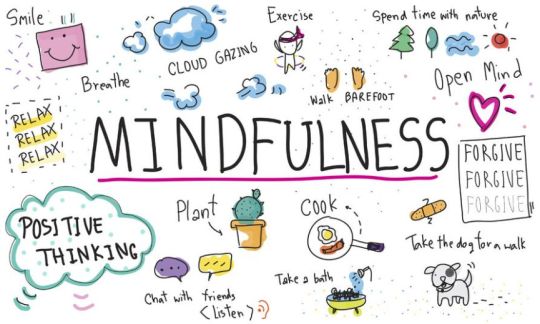
Step 5 in Recovering From a Relationship With a Narcissist or Psychopath:
Mindfulness in Recovery From Toxic Relationships
Mindfulness meditation is another important psychological tool which can help a person get in touch with and eventually heal the trauma a psychopath caused them. In a formal sense mindfulness relates to performing certain meditations to non judgmentally tune oneself into feelings, thoughts and bodily sensations in the present moment.
It is a gradual, subtle practice whereby regular meditation over a longer period of time can help a person slowly come to terms with and let go of unpleasant experiences which have happened in their lives, including psychopathic or narcissistic abuse and toxic relationships in general.
The meditations usually involve focusing on a central phenomena or “anchor point”, most often the movement of the breath in and out of the abdomen or nostrils. The object is simply to focus on this central anchor point, and whenever the mind wanders, notice where it went and bring it back to the anchor point.
Through regular practice of this simple exercise, focusing initially on the breath and then other outer (and inner) phenomena such as body sensations, sounds, thoughts and feelings, a surprising peace and clarity can come in relation to past experiences. Over time people find they can see more clearly and make peace with their past, even extremely distressing events like prolonged, toxic relationships.
We should emphasize here that mindfulness meditation is a very slow and gradual process and will not deliver results overnight. Whilst it often delivers some kind of benefit almost immediately, to reach the stage of fully letting go of past trauma will likely require regular meditation practice over a number of months or years.
For this reason, the person has to be in the process for the long haul and should not expect quick results. They should ideally be willing to set some time aside every day for meditation and be willing to wait and be patient for results. Mindfulness is perhaps best used in conjunction with other methods such as exercise and psychotherapy, as well as reducing emotional flashbacks.
That said, the benefits of mindfulness are that it is a totally free, portable, holistic method of healing that does not require any medication and is simple to take up. One does need time and commitment, but that is all they need and survivors can therefore see meditation as a free form of healing they can take with them anywhere they go.
If you are looking to give Mindfulness a try then an excellent way to get into meditation is the 8 week introductory course given by Mark Williams. This comprises of a series of 8 short meditations that run on a weekly cycle.
Practice these meditations once or twice a day for the 8 weeks and you will almost certainly gain some benefit.
Week 1 - Breathing Anchor
Week 2 & 3 – Body Scan
Week 4 – Breath and Body
Week 5 – Sounds and Thoughts
Week 6 – Exploring Difficulties
Week 7 – Befriending
Week 8 – 3 Minute Breathing Space
See also Yutthadhammo Bhikkhu’s brief 3 part introduction to meditation
How to Meditate I – What is Meditation?
How to Meditate II – Sitting Meditation
How to Meditate III – Walking Meditation
Click here for step 6
Steps: 1 | 2 | 3 | 4 | 5 | 6 | 7
source
#emotional abuse#abusive relationship#narcissistic abuse#npd#narcissistic personality disorder#healing
19 notes
·
View notes
Text
A Talk With BREATH, Portland’s New Meditative Doom Metal Duo
~By Billy Goate~

Illustrations by Tyler Wintermute
We're used to doom metal being, well, rather dark and sinister, but can it be meditative too? OM, the famous Al Cisneros side project, proved that yes, it can. Other acts, such as the celebrated UK band Bong, the New Brunswick trio Zaum followed (with Italy's Ufomammut, Finland's Dark Buddha Rising, and Ukraine's Bomg being just a step away with their generous, if often louder, landscapes).
Then I encountered doom metal yoga in Portland, and all bets were off.
Last month, Doomed & Stoned introduced you to another band you can add to your short list, whether listening in your Savasana stance ("corpse pose"), getting your groove on at work, or doing a little wake 'n bake to start the day.
This is BREATH from the City of Roses and on February 5th, all mysteries will be revealed as the meditative doom duo brings us their debut LP, 'Primeval Transmissions' (2021) on Desert Records.
Their music "is informed by adventures leaving the comforts of what was known behind. Going into unknown woods sometimes figuratively and some literal. With heavy melodically driven grooves their Meditation Doom will take you to secluded caves, and totemic vision quests'' (band bio).
Over the weekend, I traded words with Steven O'Kelly (bass guitar, vox) and Ian Caton (drums, percussion) recently to get to know this new name in the Pacific Northwest heavy underground. Doomed & Stoned also takes this opportunity to share a new visualizer with you for Breath's latest single, "Observer."
Breath - Observer
What themes and concepts does Breath explore musically and lyrically?
Peering into rituals meant to transcend the physical world. Initiations into the varied mystery schools like Orphism or Druidry I find very powerful. The Shamanistic role being so selfless putting themselves through extreme trials, shedding their previous self to protect their people by communication with spirit.
These things have lots of weight with sacrifice, and knowledge seeking from traditions nearly lost to time. Our sound aims to reflect that weight through the way we use the bass guitar and drums. I think a theme of meditation informs a lot of the riffs with spaciousness and transformation.
Who are your musical influences?
Foundationally, Black Sabbath is a center pillar. My first record being a Sabbath compilation by Earmark. I appreciate the balance they find between settled songs like "Orchid" leading into its counterpart "Lord of this World." Grails’ Burning Off Impurities is such a vehicle that I would get lost in through the whole record. Melting boundaries of East and West with Zak Riles’ classical guitar and the crushing drum work by Emil Amos.
That brings me to Om, which is an important band to me that struck a chord all the way through from the music to aesthetic. Every show I’ve been to is like I’ve snuck into a temple ceremony, and leave feeling light on my feet and blissfully ringing eardrums. "On the Mountain at Dawn" is the heaviest song to me, with this immediacy and undeniable flow like the strong current of a river.

Photographs by Marissa Caldarelli
What sort of gear do you guys perform and record with?
Ian: DW Performance series Drum kit with Maple shells. Remo heads and Aquarian Kick Drum head. Zildjian K cymbals.
Steven: 4003 Rickenbacker bass guitar. Electric Amp Innovations Power Unit 180. Ampeg 8x10 speaker cabinet. Geezer Butler Cry Baby bass wah. MXR bass compressor. Ernie Ball VP Jr. Electro Harmonix Freeze. Deluxe Bass Big Muff. Also, Shure SM 58 and VE-20 Boss Vocal Performer.
You've mentioned gaining inspiration from solitary walks in the woods. What does the Oregon outdoors mean to you and how does it stir your creative processes?
When I first tried meditation, I was given this palm sized booklet by Buddhadasa Bhikkhu on breathwork as the entrance to a practice. Feeling and visualizing blue water filling and then leaving the well of your lungs. The band like our actual breath is a lifeblood for me. Making music and lyrics I can easily and gladly lose myself in. That practice I believe is responsible for shaping our sound.
Sometimes I feel a sort of unspoken conversation with the trees that surround, lots of times getting most lyrical ideas during these hikes. Boundaries are fluid in this space, and by its very nature puts my mind out of whatever box it might’ve been in before. Wilderness here has lots of personalities through wind, rain, and sun. For me, watching trees come alive moving in the wind or the quiet calm after a rain breeds deep reflection. Nature is a mirror.

What's the biggest epiphany or the strangest thing that you've experienced while being surrounded by Mother Nature?
On a summer day at Mt. Tabor in East Portland sitting in a secluded grassy opening circled by trees, I had the most psychedelic out of body experience without the aid of eating anything. High through trance, I came to the plants and tree’s awareness of me and I them. Like they knew my name.
Many of your tracks tell a story. Are these original tales or based upon the band's own mythos?
Whether I identify with an archetype or am retelling an experience I had, All the lyrics have roots in my real life even if themes might be far flung from our time.
Primeval Transmissions by Breath
Give us a walk through your new record, track by track, if you will.
Track 1 Starting with "Evocation," it’s a mixture of Shamanistic ritual and the effects meditation can have in clearing hurdles of adversity. I had been reading a book on Druid Lore and their equivalents around the world. Then I discovered Werner Herzog’s Cave of Forgotten Dreams and was completely spellbound. Seeing cave paintings perfectly intact, it’s entrance hidden by a rock slide before Roman times in France. This painted a visual counterpart to my reading and was consumed with the world it represented. Hallucinogenic trance, their soul migrating to the spirit world through the rising smoke of the fire lighting cave art meant to dance with flickering flame. Taking on an animal guide and returning anew.
Track 2 "Dwarka" at its roots is a story about confrontation with otherworldly phenomena. There’s two personalities to it. At first the ominous impending arrival and, the character coming to grips with what he’s witnessed. The nature of the main riff reflects the enormity of space, and what might be out there. I feel like the energy of the song mirrors how the witness felt, getting heavier as the night becomes more harrowing.
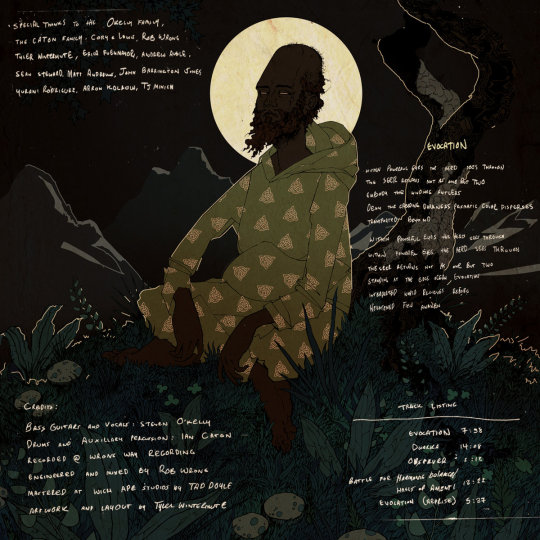
Track 3 "Observer" bridges my love of Eastern music like Ravi Shankar and Baris Manco with metal accents. It’s the journey your mind can take through meditation, simply focusing on your breath and how it can lead to intensity. Mainly one riff building and transforming over the course of Observer. The lyrics are a recording of Sri Swami Satchidananda leading Hatha Yoga, an important teacher for me.
Track 4 "Battle for Harmonic Balance" is centered around the ancient mystery schools of the left and right Eye of Horus. Invoking themes of renewal like the Akhet, a Sun rising between two mountains. Heaviness from the beginning reflecting the weight of importance Egypt holds to me, being a cornerstone of our past. The riff deconstructs towards the end, aligning the song like the Sphinx during the Equinox. Facing East to summon the Sun once more. "Halls of Amenti" is the realm of the Gods, where the Sun goes at night. An ethereal ceremony exchanging distortion and drums for the hypnotic beat of a Shaker and deep Bass guitar.
Track 5 The reprise to "Evocation" is a continuation of the Shaman’s trek across the razor’s edge. With this offering without lyrics we convey the obstacles, lulls, and successful return starting with the similar ritual beginning as its first chapter. This is followed by a call and response conversation between drums and bass guitar. Floating in the ether until finding his way alongside the totemic animal guide culminating at the end, returning to body like the tide returns out to Sea.
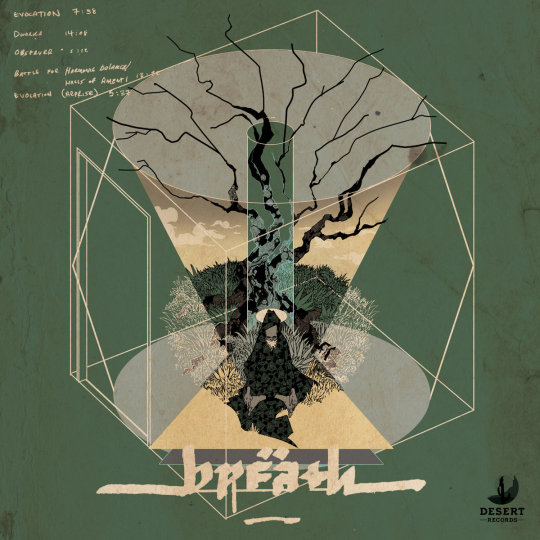
Follow The Band
Get Their Music
#D&S Interviews#Breath#Portland#Oregon#doom#meditative#metal#doom metal#meditative doom#interview#Desert Records#Doomed and Stoned
5 notes
·
View notes